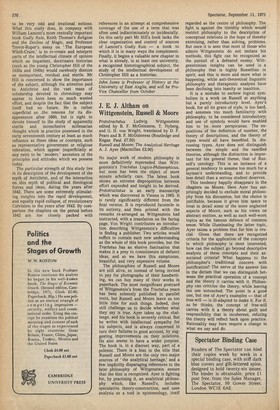J. E. J. Altham on Wittgenstein, Russell & Moore
Prototractatus Ludwig Wittgenstein edited by B. F. McGuinness, T. Nyberg, and G. H. von Wright, translated by D. F. Pears and B. F. McGuinness (Routledge and Kegan Paul £7.50)
Russell and Moore: The Analytical Heritage A. J. Ayer (Macmillan £3.90)
No major work of modern philosophy is more definitively superseded than Wittgenstein's Tractatus Logico-Philosophicus, but none has been the object of more minute scholarly care. The latest book shows an extreme disproportion between effort expended and insight to be derived. Prototractatus is an early manuscript which was discovered in Vienna in 1965. It is rarely significantly different from the final version. It is reproduced facsimile in Its entirety, and then printed with the remarks re-arranged as Wittgenstein had instructed, with a translation on the facing page. Von Wright contributes an introduction describing Wittgenstein's difficulties in finding a publisher. Two articles would suffice to contain such new understanding as the whole of this book provides, but the Tractatus has an elusive fascination that makes it a prey to connoisseurs of defunct ideas, and so we have this sumptuous, beautiful, and very expensive volume.
The philosophies of Russell and Moore are still alive, so instead of being invited to pay for photographs of their handwriting, we can buy many of their works in paperback. The most insignificant postcard of Wittgenstein's from the Tractatus years has been solemnly published in parallel texts, but Russell and Moore leave us too little time for such things. Indeed, they still challenge us to decide whether what they say is true. Ayer takes up the challenge, and his book is severely critical. But he writes with intellectual sympathy for his subjects, and is always concerned to turn their failures to good account, by suggesting improvements on their solutions. He also seems to have a wider purpose. The book is, in a discreet way, part of a polemic. There is a hint in the title that Russell and Moore are the only two major sources of the analytical heritage,' and a few implicitly disparaging references to the later philosophy of Wittgenstein ensure that the hint is recognized. Ayer is fighting for, by practising it, an analytical philosophy which, like Russell's, includes speculative theory-construction, and uses analysis as a tool in epistemology, itself regarded as the centre of philosophy. The fight is against the timidity which would restrict philosophy to the description of conceptual relations in the hope of thereby exorcising, rather than solving, problems. But once it is seen that most of those who admire Wittgenstein do not imitate his methods, this fight can be recognized as the pursuit of a defeated enemy. Wittgensteinian insights can be used in a philosophy that is highly Russellian in spirit, and this is more and more what is happening, while anti-theoretical linguistic philosophy and therapeutic analysis have been declining into inanity or inanition.
It is a mistake to eschew logical symbolism in a work on Russell at anything but a purely introductory level. Ayer's book, for all its grace of style, is too hard, and assumes too much familiarity with philosophy, to be considered introductory; and use of symbols would have enabled him to be more perspicuous. The expositions of the definition of number, the theory of descriptions, and the theory of types would all have benefited. In discussing types, Ayer does not distinguish between the simple and the ramified theories, although the distinction is important for his general theme, that of Russell's ontology. This is an instance of a general tendency to assume too much for a layman's understanding, and to provide less detail than a serious student deserves.
This tendency happily disappears in the chapters on Moore. Here Ayer has surprisingly decided to exclude moral philosophy from his discussion, but the choice is jastifiable, because it gives him space to treat in detail some of the more neglected aspects of Moore, such as his views on abstract entities, as well as such well-worn topics as the famous defence of common sense. While illuminating the latter topic, Ayer raises a problem that for him is crucial. Given that there are recognized criteria for the application of the concepts in which philosophy is most interested, how can the subject go beyond descriptive analysis of these concepts and their associated criteria? What happens to the philosopher's traditional concern with justification? The nerve of the answer lies in the dictum that we can distinguish between the practical operation of a concept and the theory it carries with it. Philosophy can criticize the theory, while leaving the use untouched. The point is a good one, but one of Ayer's examples — that of free-will — is ill-adapted to make it. For if, as he thinks, the concept of free-will carries with it a theory about guilt and responsibility that is incoherent, refuting the theory will reflect back upon practice. Rationality may here require a change in what we say and do.










































 Previous page
Previous page